
How to Use ESP32 (30 pin): Examples, Pinouts, and Specs
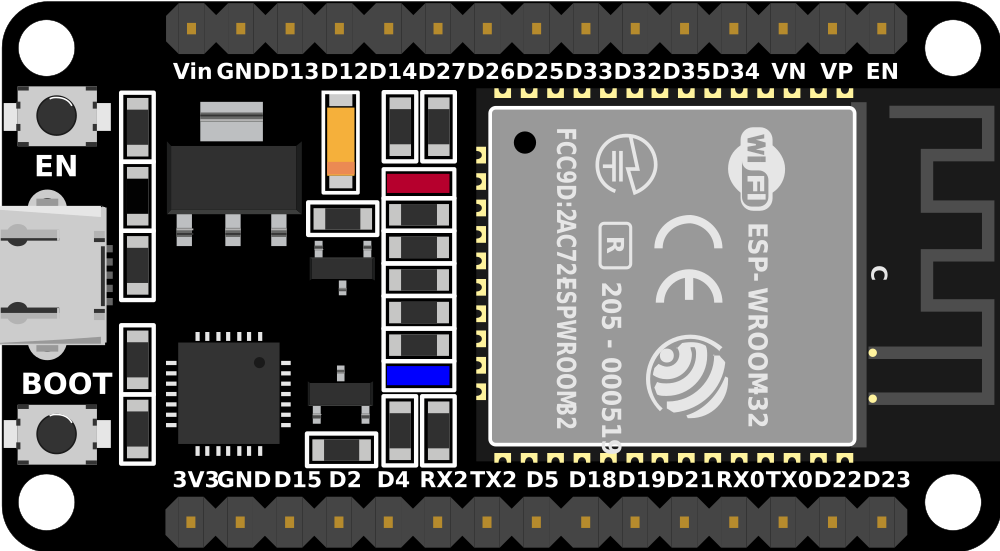
 Design with ESP32 (30 pin) in Cirkit Designer
Design with ESP32 (30 pin) in Cirkit DesignerIntroduction
The ESP32 is a powerful microcontroller developed by Espressif Systems, featuring integrated Wi-Fi and Bluetooth capabilities. With its 30-pin configuration, the ESP32 is designed to support a wide range of input/output (I/O) functions, making it an ideal choice for Internet of Things (IoT) applications, embedded systems, and smart devices. Its high processing power, low energy consumption, and versatile connectivity options make it a popular choice among hobbyists and professionals alike.
Explore Projects Built with ESP32 (30 pin)
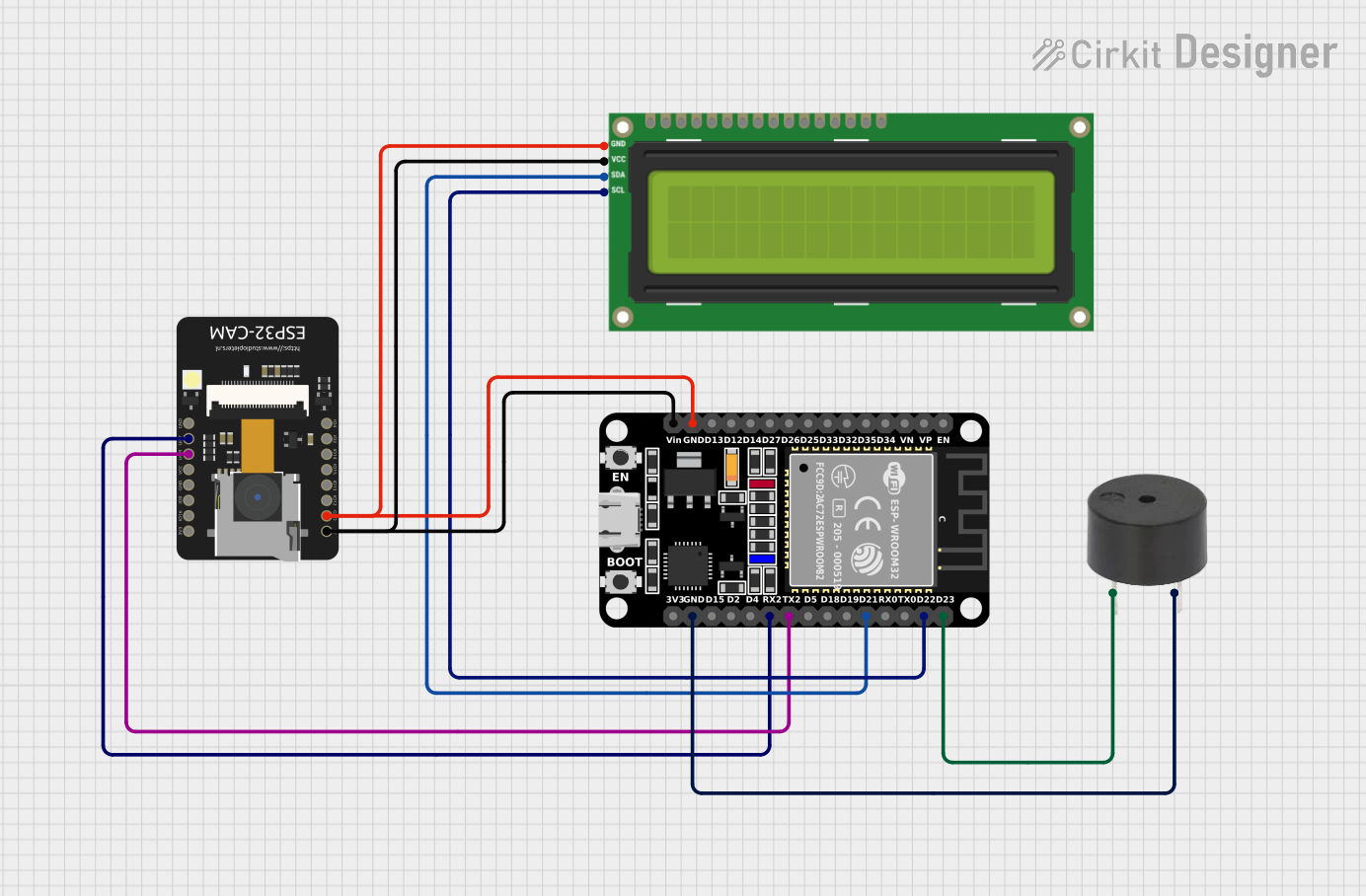
 Open Project in Cirkit Designer
Open Project in Cirkit Designer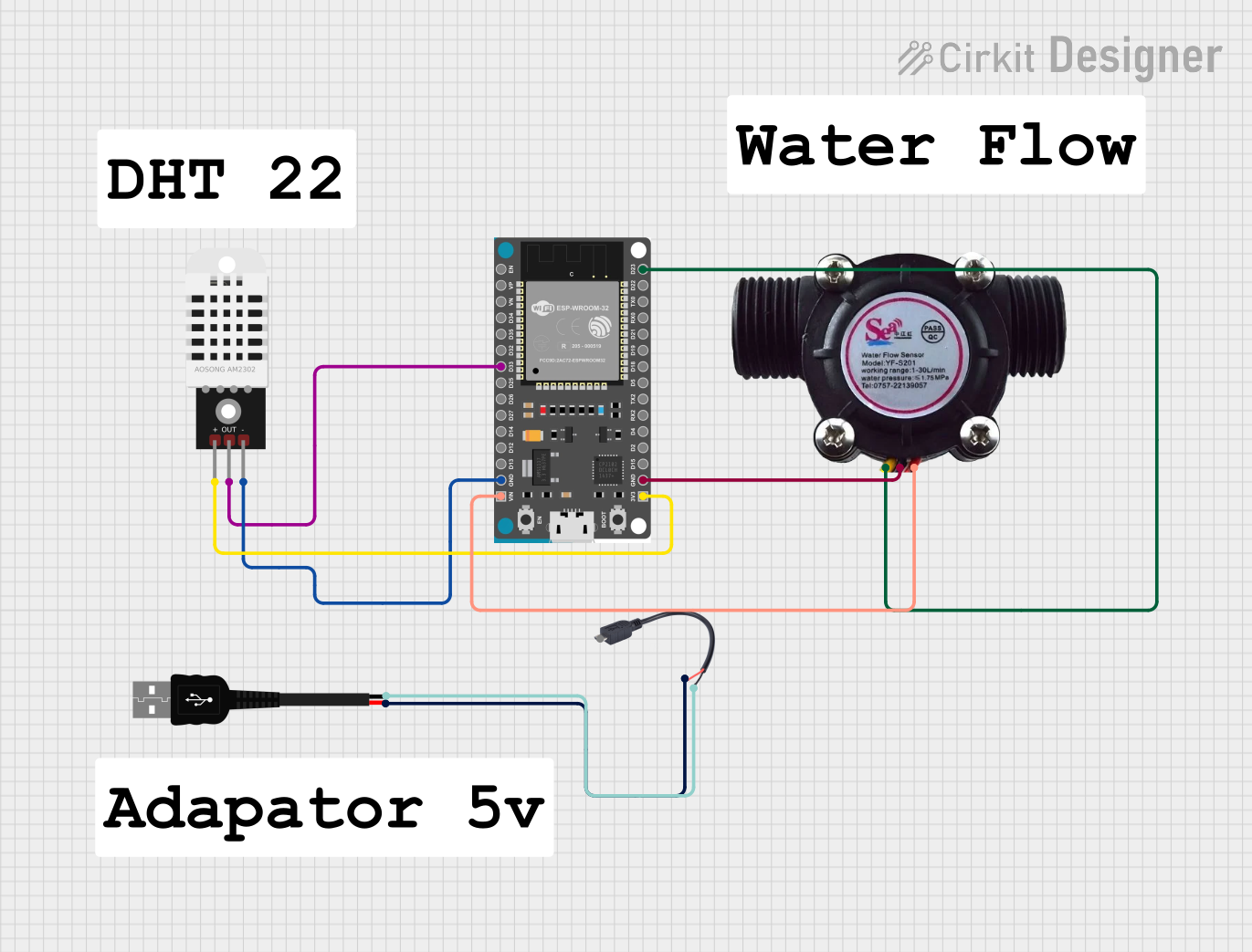
 Open Project in Cirkit Designer
Open Project in Cirkit Designer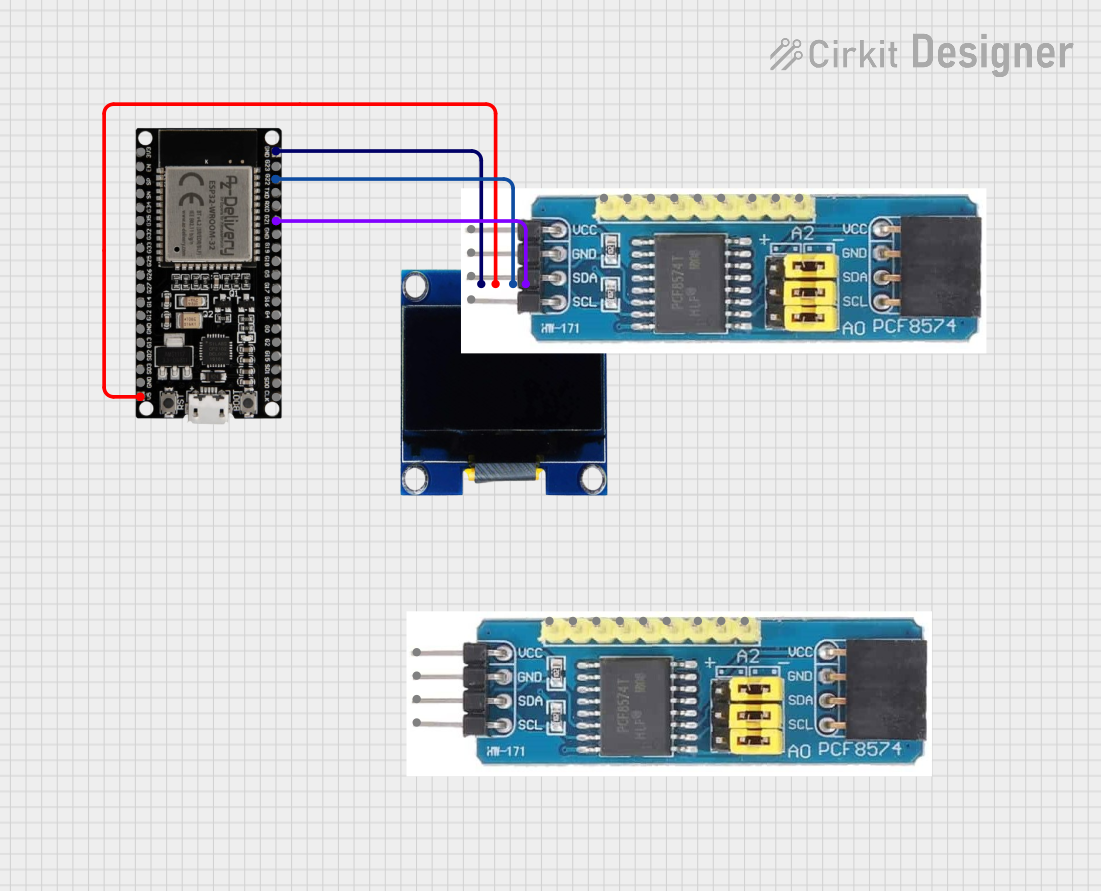
 Open Project in Cirkit Designer
Open Project in Cirkit Designer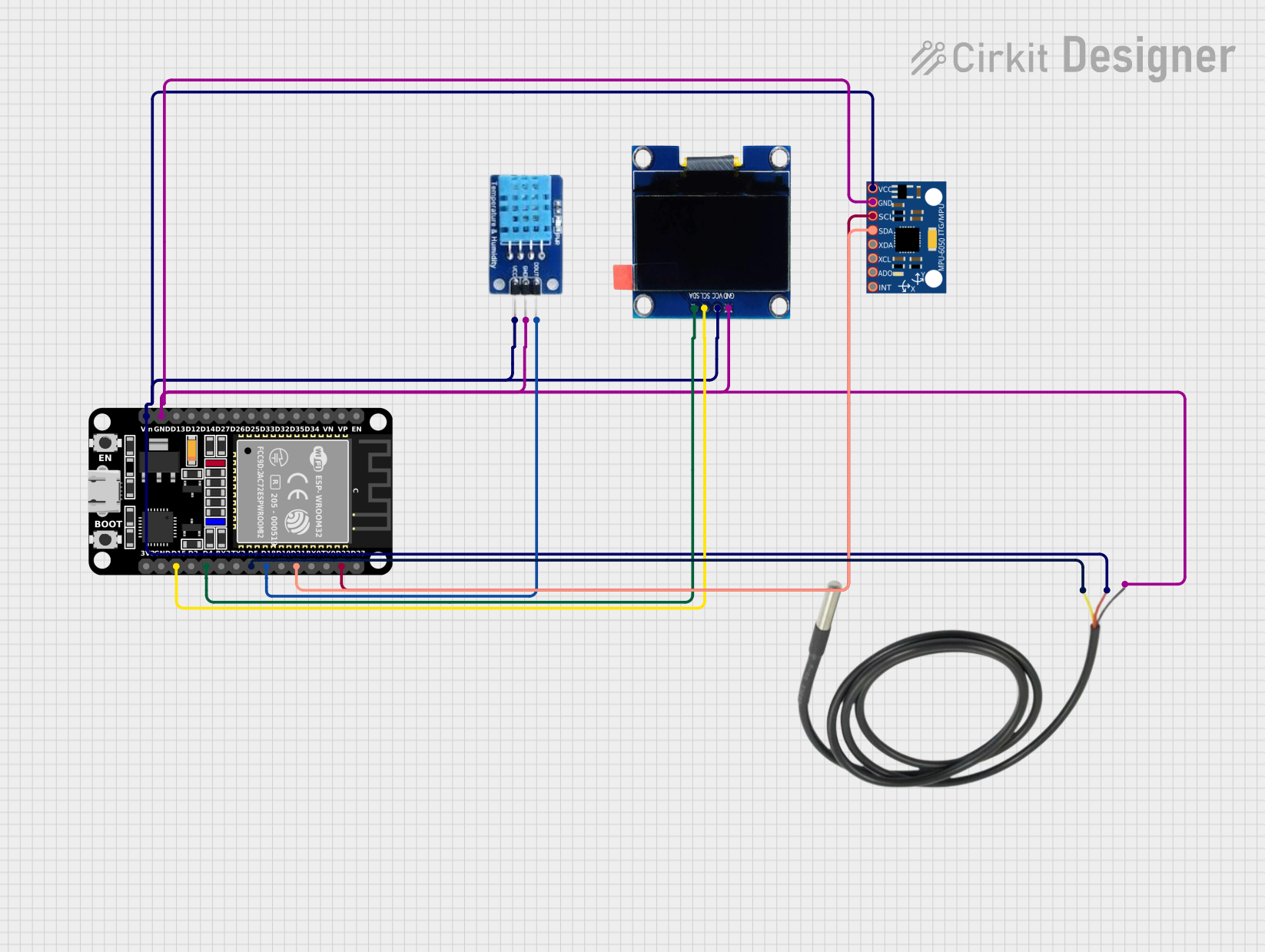
 Open Project in Cirkit Designer
Open Project in Cirkit DesignerExplore Projects Built with ESP32 (30 pin)

 Open Project in Cirkit Designer
Open Project in Cirkit Designer
 Open Project in Cirkit Designer
Open Project in Cirkit Designer
 Open Project in Cirkit Designer
Open Project in Cirkit Designer
 Open Project in Cirkit Designer
Open Project in Cirkit DesignerCommon Applications and Use Cases
- IoT devices and smart home automation
- Wireless sensor networks
- Wearable technology
- Robotics and drones
- Industrial automation
- Prototyping and development of connected devices
Technical Specifications
The ESP32 (30 pin) microcontroller offers the following key technical specifications:
| Parameter | Value |
|---|---|
| Manufacturer | Espressif Systems |
| Part ID | ESP32 |
| Operating Voltage | 3.3V |
| Input Voltage Range | 3.0V - 3.6V |
| Digital I/O Pins | 30 |
| Analog Input Pins | 16 (12-bit ADC) |
| Analog Output Pins | 2 (8-bit DAC) |
| Wi-Fi Standard | 802.11 b/g/n |
| Bluetooth Standard | Bluetooth 4.2 (Classic and BLE) |
| Flash Memory | 4MB (varies by model) |
| SRAM | 520KB |
| Clock Speed | Up to 240 MHz (dual-core Xtensa® LX6 processor) |
| Operating Temperature | -40°C to +85°C |
| Communication Interfaces | UART, SPI, I2C, I2S, CAN, PWM |
| Power Consumption | Ultra-low power consumption in deep sleep mode (~10 µA) |
Pin Configuration and Descriptions
The ESP32 (30 pin) microcontroller has the following pinout:
| Pin Number | Pin Name | Description |
|---|---|---|
| 1 | EN | Enable pin. Active high. Used to reset the chip. |
| 2 | IO1 | GPIO1. General-purpose I/O pin. |
| 3 | IO2 | GPIO2. General-purpose I/O pin. |
| 4 | IO3 | GPIO3. General-purpose I/O pin. |
| 5 | IO4 | GPIO4. General-purpose I/O pin. |
| 6 | IO5 | GPIO5. General-purpose I/O pin. |
| 7 | IO6 | GPIO6. General-purpose I/O pin. |
| 8 | IO7 | GPIO7. General-purpose I/O pin. |
| 9 | IO8 | GPIO8. General-purpose I/O pin. |
| 10 | IO9 | GPIO9. General-purpose I/O pin. |
| 11 | IO10 | GPIO10. General-purpose I/O pin. |
| 12 | IO11 | GPIO11. General-purpose I/O pin. |
| 13 | IO12 | GPIO12. General-purpose I/O pin. |
| 14 | IO13 | GPIO13. General-purpose I/O pin. |
| 15 | IO14 | GPIO14. General-purpose I/O pin. |
| 16 | IO15 | GPIO15. General-purpose I/O pin. |
| 17 | IO16 | GPIO16. General-purpose I/O pin. |
| 18 | IO17 | GPIO17. General-purpose I/O pin. |
| 19 | IO18 | GPIO18. General-purpose I/O pin. |
| 20 | IO19 | GPIO19. General-purpose I/O pin. |
| 21 | IO20 | GPIO20. General-purpose I/O pin. |
| 22 | IO21 | GPIO21. General-purpose I/O pin. |
| 23 | IO22 | GPIO22. General-purpose I/O pin. |
| 24 | IO23 | GPIO23. General-purpose I/O pin. |
| 25 | IO24 | GPIO24. General-purpose I/O pin. |
| 26 | IO25 | GPIO25. General-purpose I/O pin. |
| 27 | IO26 | GPIO26. General-purpose I/O pin. |
| 28 | IO27 | GPIO27. General-purpose I/O pin. |
| 29 | IO28 | GPIO28. General-purpose I/O pin. |
| 30 | IO29 | GPIO29. General-purpose I/O pin. |
Usage Instructions
How to Use the ESP32 in a Circuit
- Powering the ESP32: Connect the 3.3V pin to a stable 3.3V power source. Ensure the ground (GND) pin is connected to the circuit's ground.
- Programming the ESP32: Use a USB-to-serial adapter or a development board with a built-in USB interface to upload code to the ESP32. The ESP32 is compatible with the Arduino IDE, PlatformIO, and Espressif's ESP-IDF.
- Connecting Peripherals: Use the GPIO pins to connect sensors, actuators, and other peripherals. Refer to the pin configuration table for specific pin functions.
- Wi-Fi and Bluetooth Setup: Use the built-in libraries in the Arduino IDE or ESP-IDF to configure Wi-Fi and Bluetooth connectivity.
Important Considerations and Best Practices
- Voltage Levels: The ESP32 operates at 3.3V. Avoid applying 5V to any GPIO pin to prevent damage.
- Power Supply: Use a stable power supply to avoid brownout issues, especially when using Wi-Fi or Bluetooth.
- Deep Sleep Mode: Utilize the deep sleep mode to conserve power in battery-powered applications.
- Pull-up/Pull-down Resistors: Some GPIO pins require external pull-up or pull-down resistors for proper operation.
Example Code for Arduino IDE
Below is an example code to connect the ESP32 to a Wi-Fi network and print the IP address:
#include <WiFi.h> // Include the Wi-Fi library
const char* ssid = "Your_SSID"; // Replace with your Wi-Fi SSID
const char* password = "Your_Password"; // Replace with your Wi-Fi password
void setup() {
Serial.begin(115200); // Initialize serial communication at 115200 baud
delay(1000); // Wait for a second to stabilize
Serial.println("Connecting to Wi-Fi...");
WiFi.begin(ssid, password); // Start Wi-Fi connection
while (WiFi.status() != WL_CONNECTED) {
delay(500); // Wait for connection
Serial.print(".");
}
Serial.println("\nWi-Fi connected!");
Serial.print("IP Address: ");
Serial.println(WiFi.localIP()); // Print the device's IP address
}
void loop() {
// Add your main code here
}
Troubleshooting and FAQs
Common Issues and Solutions
ESP32 Not Connecting to Wi-Fi
- Solution: Double-check the SSID and password. Ensure the router is powered on and within range.
- Tip: Use
WiFi.status()to debug connection issues.
Brownout Detector Triggered
- Solution: Ensure the power supply provides sufficient current (at least 500mA).
- Tip: Use a capacitor (e.g., 100µF) across the power supply to stabilize voltage.
GPIO Pin Not Responding
- Solution: Verify the pin configuration in your code. Check for conflicting pin assignments.
- Tip: Use a multimeter to check the voltage levels on the pin.
Code Upload Fails
- Solution: Ensure the ESP32 is in bootloader mode by holding the "BOOT" button during upload.
- Tip: Check the USB cable and port for proper connection.
FAQs
Q: Can the ESP32 handle 5V logic levels?
- A: No, the ESP32 operates at 3.3V. Use a level shifter for 5V devices.
Q: How do I reset the ESP32?
- A: Press the "EN" button on the development board or toggle the EN pin.
Q: Can I use the ESP32 with the Arduino IDE?
- A: Yes, the ESP32 is fully compatible with the Arduino IDE. Install the ESP32 board package to get started.